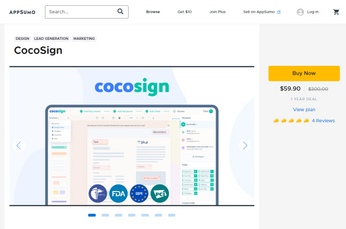
8 Benefits of the Electronic Signature for Real Estate
You must guarantee the seamless execution of each real estate transaction as a real estate professional. It's an extensive job that calls for a high level of competence, particularly in negotiation and counseling customers with the purchase and sale of real estate. By using an electronic signature, you can make signing documents more efficient while giving your customers an easy method to make their plans of buying or selling their property conveniently.
This article elucidates the advantages of using an electronic signature in real estate transactions. This article presents a compilation of verified but obscure benefits of using electronic signatures in the real estate industry. We hope to reduce the need for individual research by providing this information.
What Is an Electronic Signature and How Does It Work?
Your identity can be represented in digital data using an electronic signature, also known as an e-signature. Your electronic signature marks consent and acknowledgment for each document you sign.
You might consider it the digital equivalent of your handwritten signature but with additional benefits.
Is an Electronic Signature Acceptable When Signing a Real Estate Document?
Your handwritten signature holds the same validity that your electronic signature does. Despite this, there is no guarantee that it will be enforceable in a court of law.
Whether you're an individual or a web design company, you must comply with various norms and regulations, including the E-Sign Act of 2000, for it to become legally enforceable.
Several other considerations are also necessary, such as determining whether or not the signature used to sign the document is genuine.
There are three primary types of digital signatures.
Let's review the fundamentals of the most common electronic signatures: basic, advanced, and certified.
1. Basic Electronic Signature
Essential electronic signatures (such as "I'm not a robot") don't need to resemble handwritten signatures in any way.
However, the potential for fraud is elevated because they are inexpensive, simple to employ, and simple to contest in court.
2. Advanced Electronic Signature
The sign uses sophisticated electronic signatures, the most reliable form of digital signature when it comes to the vast majority of applications.
They demand that the identification of the signature be one that can only be associated with the signer (for example, access to a particular bank account or phone number).
Encryption and digital signatures are two methods utilized to safeguard data from being altered in the future.
3. Qualified Electronic Signature
The creation of qualified electronic signatures often involves the use of specific technology, such as optical character recognition (OCR). In addition, each signatory is required to identify themselves as being affiliated with a specific service provider.
This approach to electronic signatures is incredibly safe but also quite expensive, making it unworkable for many different kinds of companies.
As a result, qualified electronic signatures are most valuable when used for agreements that include a high level of value or risk, such as the ownership of real estate assets or their transfer.
What are the proven advantages of electronic signatures for realtors?
The following are eight proven benefits of electronic signatures for realtors, many of which are commonly overlooked:
#1. Lower the cost
In light of prevailing economic trends, pursuing cost reductions has emerged as a primary objective for organizations, prompting them to seek solutions that may optimize their return on investment.
According to research findings, using e-signature systems has reduced costs by around $36 per document, including expenses associated with paper usage, printing, shipping, and storage.
Additionally, it mitigates expenses linked to human fallibility and situations whereby essential data is absent from the papers, which is critical during the disposition in real estate, where errors in property transfer documents can lead to costly delays.
Contracts that contain errors have the potential to incur processing costs up to four times higher than contracts that are presented without any faults initially. In light of prevailing economic trends, pursuing cost reductions has emerged as a primary objective for organizations, prompting them to explore various strategies, including fundraising strategies for PE funds, that may optimize their return on investment.
The use of this technology by the South Carolina Department of Health resulted in cost savings of $4 million and the elimination of 2.89 million paper documents annually.
Similarly, the University of Texas achieved cost savings of $2.5 million by adopting this technology.
Furthermore, the implementation of electronic signatures, along with real estate tools, can significantly decrease travel-related costs. For instance, when a realtor conducts a real estate listing presentation and the buyer decides to proceed, the necessary documents can be signed electronically, eliminating the need for an in-person meeting. This not only reduces travel expenses but also optimizes the use of time resources.
For real estate investors, especially those securing rental properties, digital signatures streamline the financing process. Since by working with the best DSCR lender investors can get loans according to the rental income by simply submitting electronically signed documents, reducing the time required for loan approval and accelerating property acquisition.
#2. Increasing productivity
Electronic signature systems completely automate the process of document flow, enhancing the efficiency of contract execution and serving as a great productivity-boosting tool for employees. You can also use real estate CRM to automate and streamline the entire process.
For Example, A client named Thermo Fisher has successfully utilized digital signs to establish compliant and highly efficient workflows, resulting in immediate benefits for its clients.
Upon the successful integration of the digital signature, the supply firm located in Massachusetts observed a significant reduction in the duration required to perform previously laborious procedures.
As an illustration, the mean duration for the development of standard operating procedures was decreased from six weeks to two, while the initiation of change controls currently requires less than ten days, in contrast to the previous duration of five weeks.
#3. Improved client experience
Ensuring favorable client experiences is essential to effectively managing a prosperous enterprise. Using e-signature technology may contribute to this objective through intelligent functionalities that enhance usability.
Electronic signatures enable consumers to conveniently affix their signatures and submit papers by just clicking a mouse or tapping a finger, regardless of their geographical location, and on a wide range of electronic devices. This technology simplifies the rental application process for apartments for rent in Salt Lake City, allowing tenants to sign leases remotely.
Research has demonstrated the positive outcomes associated with prioritizing user-friendliness, as seen by a notable 57% of enterprises that have used electronic signature technology reporting a notable rise in customer satisfaction pertaining to the digital agreement procedure.
The banks have realized how convenient it is for people to do e-signatures, and are offering bridging loans which can be signed with an esignature, so their customers don't have to go to the bank personally.
#4. Greater safety and privacy
The transportation of physical contracts between signatories, especially in scenarios involving numerous signatures, heightens the potential for privacy breaches.
In contrast, electronic signature technology ensures the secure storage of a document in a singular digital repository.
It enables monitoring modifications made to a contract throughout the signing procedure.
Routing rules can be explicitly defined to ensure that signatories are granted access to a document sequentially based on their authorization level. This safeguards the document from any potential manipulation during the routing process.
In contrast to wet signatures, electronic signatures have the advantage of being accompanied by an electronic record, which functions as an audit trail and substantiates the occurrence of the transaction.
The audit trail encompasses a comprehensive history of the various actions undertaken with the document, containing pertinent information such as its opening, viewing, and signing.
If a signer raises concerns regarding their signature or any uncertainties arise about the transaction, the audit trail becomes accessible to all individuals involved in the transaction.
Keep in mind that email deliverability is very important in this industry, as your records need to be received by the recipient securely.
#5. Less paper records need to be stored
An electronic signature acts like an electronic version of your business card - Eliminating the need for paper.
Numerous electronic signature systems give users the advantage of limitless digital storage, facilitating the efficient retrieval and organization of documents.
Consequently, the need for allocating physical storage space to accommodate signed contracts, agreements, and other essential papers is eliminated.
#6. Quick implementation
Additionally, tools like a digital business card for realtors can further streamline communication and enhance professional interactions, complementing the integration of electronic signatures.
Numerous electronic signature systems seamlessly integrate into existing workflows and operate with pre-existing technologies such as existing real estate apps.
This feature enables the rapid implementation of electronic signatures for organizational workflows.
Digital signature companies provide a comprehensive array of tools to facilitate the effective adoption of eSignature within your team.
These resources encompass a substantial customer success platform that delivers installation services, live and online educational courses, and round-the-clock support.
#7. Fewer inaccuracies and mistakes
The use of automated processes across the contract lifecycle, encompassing document production, collaboration, workflow management, and establishing a centralized agreement repository, has reduced business mistakes.
Errors and mistakes are reduced when using an electronic signature solution since it guides the signer through the document step by step.
E-signatures result in a 49% reduction in the number of mistakes made overall.
#8. Environmental Friendly
The adoption of electronic documents by clients has resulted in the establishment of an environmentally sustainable setting, as it has effectively curtailed the use of over 55 billion sheets of paper.
This reduction in paper consumption is proportional to the preservation of nearly 6 million trees.
The implementation of digital business cards and eSignature technology has greatly diminished organizations' dependence on conventional and outdated modes of communication, as it has brought about a transformative shift in the manner in which documents are exchanged, signed, and archived.
However, for in-person networking, a custom business card design can still make a lasting impression, ensuring your brand stands out with a professional and memorable look.
The utilization of eSignature technology obviates the necessity for physical printing, faxing, scanning, mailing, and storing of paper documents since it offers a swift and user-friendly electronic method for signing papers.
#9. Improves customer experience and loyalty
E-signatures provide real-time access to documents, whether they are being used on a mobile device or a desktop computer. Use custom email templates with your signature to send to recipients. This can increase their trust in your business.
This speeds up transactions and eliminates the need for printing or scanning. Satisfied customers are more likely to remain loyal to your company and advocate for it.
#10. Enhances Motility
Do you have a staff that is mainly comprised of mobile workers? Your reach may be expanded since you can send electronic papers anytime, anywhere, and to anybody.
Additionally, according to Jack Roberts from Hard Money Lenders IO, papers can be received, reviewed, and signed on mobile devices, which increases the client's convenience and turnaround time.
Final Words on digital signature for real estate
The real estate market is undergoing constant evolution, with advancements such as internet listings and 3D virtual tours shaping its future trajectory. In the present day, individuals have the convenience of utilizing internet platforms to search for and acquire houses, therefore avoiding the challenges associated with traditional methods of house searching. Hence, it is suitable to align it with a contemporary form of concluding a real estate transaction, namely electronic signatures.
In addition to that, in this digital age, property management is increasingly embracing electronic signatures as a contemporary form of concluding real estate transactions. This enables property managers to streamline processes, expedite transactions, and enhance overall efficiency in managing properties, aligning with the modern expectations of clients and stakeholders in the real estate industry.





